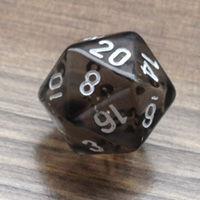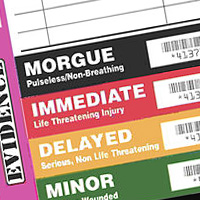Magic Is Not About The Tricks. It’s About The Man.
(Andrew Masters is a good friend and frequently brilliant writer. Partly because he is brilliant, and partly because it means I get to take a break this week, I asked him if he’d be up for writing a guest post for this site. If you like it, I can also highly recommend his award-winning piece The Paladin of East Bentleigh.)
"In a room sit three great men, a king, a priest, and a rich man with his gold. Between them stands a sellsword, a little man of common birth and no great mind. Each of the great ones bids him slay the other two. ‘Do it,’ says the king, ‘for I am your lawful ruler.’ ‘Do it,’ says the priest, ‘for I command you in the names of the gods.’ ‘Do it,’ says the rich man, ‘and all this gold shall be yours.’ So tell me – who lives and who dies?"
-George R R Martin, A Clash of Kings.
Who lives, George? That’s easy. Probably the king. Maybe the priest. Not the rich guy.
Why? Because the sellsword will obey the authority figure he understands least. We all do it. Mystery generates power.
Image you’re at an art gallery in Russia. You’re looking at a painting. A uniformed security guard comes up to you, looking cross, and says ‘Follow me.’ He walks towards a shadowy doorway.
What did you do? You followed him, right? You didn’t want to, but you followed him because you didn’t know the consequences of rejecting his authority.
Now imagine you’re at that same Russian art gallery. The security guard comes over and this time he says ‘Follow me through that shadowy doorway, or I’ll kick you out of here.’
Did you follow him? I bet the compulsion was weaker. The guard’s extra words have revealed the extent of his power. Instead of an intimidating ultimatum, you had a choice.
Back to George’s riddle. The sellsword knows that obeying the rich man means he gets money, and disobeying gets him no money. That’s a choice. He knows that obeying the priest will get him blessings, and disobeying will get him probably nothing. That’s not very compelling unless the sellsword is particularly religious. But the king – who knows what amazing benefits will come from helping the king? Who knows what horrible torture will come of disobeying? The king’s power is unknown, and thus he has the most.
Good. So what does that mean for magic?
When I watch David Copperfield fly, the amusing intellectual exercise of ‘wow, how does he do it?’ only tickles the surface. The rest of me is involuntarily gathering evidence that David is some kind of god.
Hamish Blake once observed that whenever he sees a child in a Superman costume, a small part of his brain always whispers ‘That’s not the real Superman.’
Watching the 1989 Magic of David Copperfield TV special is the same as Hamish’s Superman encounter, but in reverse. I start with the assumption that David is a normal human who knows some clever tricks. I can see that he is standing on a stage and I know that magic’s totally not real.
But then David does something impossible and I start rejecting what I know. I spend the rest of the show gleefully tearing the case for David being a mere illusionist apart with the irrefutable evidence of magic powers on display.
By the end, I am faced with a being of strange and, importantly, uncertain abilities. David can produce living birds from nothing. He can penetrate the Great Wall. He can fly!
Who knows the extent of this man’s power?
And what does David want? Do his puffy-shirted arm movements signify something I don’t understand? Are those girls climbing into death machines willingly, or are they also under his spell? Before the ad break, he claims to love magic’s power to entertain, but why?
Mystery piles upon mystery. It doesn’t matter that, deep down, I still know it’s all tricks. I can still feel David’s authority grow. By the end, if he told me to follow him in the Russian art gallery, I’d never dare refuse.
That’s the part that makes the show great. The tricks are kinda dorky. The unlimited potential of David’s apparent magic powers are curious if you want to go there. But the unavoidable sensation that this ridiculous character is inherently superior to me? That’s thrilling.
- Andrew is not a magician.


